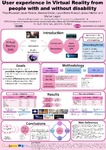Mostrar o rexistro simple do ítem
User experience in virtual reality from people with and without disability
| dc.contributor.author | Pousada, Thais | |
| dc.contributor.author | Pereira-Loureiro, Javier | |
| dc.contributor.author | Broba, Betania | |
| dc.contributor.author | Nieto-Riveiro, Laura | |
| dc.contributor.author | Martín, Jessica | |
| dc.contributor.author | Lagos Rodríguez, Manuel | |
| dc.date.accessioned | 2023-09-05T10:27:06Z | |
| dc.date.available | 2023-09-05T10:27:06Z | |
| dc.date.issued | 2023-07 | |
| dc.identifier.citation | Pousada T, Pereira J, Groba B, Nieto-Riveiro L, Martín J, Lagos M. User experience in virtual reality from people with and without disability. Póster presentado en: 25th International Conference on Human-Computer Interaction (HCI International 2023); 2023 Jul 23-28; Copenhaguen, Denmark | es_ES |
| dc.identifier.uri | http://hdl.handle.net/2183/33439 | |
| dc.description.abstract | [Abstract] Virtual Reality (VR) is a resource for leisure and participation. Recently, VR applications have been introduced progressively into health interventions. The possibility of being immersed in virtual scenarios offers an opportunity to recreate real spaces in a rehabilitation room and to become more motivating. There exist interesting open-access games and applications in platforms such as STEAMVR, VIVEPort or META, that can be used during rehabilitation. Nevertheless, the main problem is the lack of usability and possibility to adapt these applications to demands of final users. The use of VR is conditioned, also, by the experience and perspective of the people. Purpose of research was to analyze and determine the possibilities of generic VR applications from the perspective of final users, based on their experience. A cross-sectional study was done, with sample divided into two groups: people with (N = 24) and without disability (N = 34). The Game Experience Questionnaire (GEQ) was applied. The applications analyzed were: IkeaVRPancake Kitchen, TheBlue, Adventure climb, Google EarthVR, Cube dancer, Blobby tennis and Richie’s PlankExperience. Results indicated that people without disabilities felt an experience more immersive in VR. No significant differences were obtained concerning the GEQ Post-game. The application with the higher score in terms of positive experience was Richie’s PlankExperience (M = 2,32), and concerning competence was Google EarthVR (M = 2,6) In general, the game experience was positive, but there are still some difficulties detected to implement the games into rehabilitation: control manipulation, interface person-application and understanding instructions. So, is needed to implement adaptations into the games to facilitate their use by people with disabilities. | es_ES |
| dc.description.sponsorship | PID 2019-104323RB-C33; Ministerio de Ciencia e Innovación (España) | es_ES |
| dc.language.iso | eng | es_ES |
| dc.relation.uri | https://doi.org/10.1007/978-3-031-35992-7_49 | es_ES |
| dc.subject | Virtual reality | es_ES |
| dc.subject | Disability | es_ES |
| dc.subject | User experience | es_ES |
| dc.subject | Accesibility | es_ES |
| dc.subject | First section | es_ES |
| dc.title | User experience in virtual reality from people with and without disability | es_ES |
| dc.type | info:eu-repo/semantics/conferenceObject | es_ES |
| dc.type | info:eu-repo/semantics/conferenceObject | es_ES |
| dc.rights.access | info:eu-repo/semantics/openAccess | es_ES |
| UDC.conferenceTitle | HCI International 2023 | es_ES |






